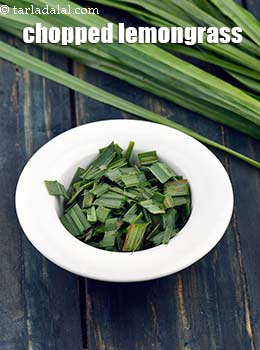· Due to its citrus flavor, it can be used in variety of recipes.
· You can dry or powder it and use as a flavoring agent in teas and drinks or cordials.
· Lemon grass can be eaten raw in salads.
· Its juice can be made and had in warm weathers.
How to store lemongrass, lemon grass, hare chai ki patti
You can wrap it in a damp paper and store under refrigeration temperature. This will allow its fresh aroma to remain intact, until its use. Lemon grass remains fresh for at least 1 week, if stored under refrigeration.
Health benefits of lemongrass, lemon grass, hare chai ki patti
Lemongrass is proven to be antibacterial and anti fungal. Sometimes, it is used as a mild insect repellent. Regular consumption of lemongrass helps in cleansing and detoxifying the liver, kidneys, digestive system, urinary tract and pancreas because of the presence of antioxidant quercetin in it. The same
antioxidant can also help
reduce the "bad" cholesterol from our body and improves blood circulation, thus exhibiting
heart protecting benefits. Lemongrass also has some amounts of
iron,
vitamin C,
phosphorus,
calcium and
potassium. It is also used to make ointment to improve skin texture by reducing acne, pimples and oil secretion. Thus it is a
skin toner.
Chopped lemongrass

Chopped Lemon grass is generally used in salads. For chopping it, first wash and drain thoroughly. Remove the two extreme ends, which are inedible. Now place the grass as a bunch on chopping board in horizontal manner. Start cutting it using a sharp knife in ½ inch diameter. You may decrease or increase the diameter to obtain finer or coarser pieces as per the recipe requirement.
Lemongrass juice

Lemongrass juice can be easily prepared at home by using a simple method. Extracting this juice is quite different as compared to normal fruit or vegetable juices.
While there are several methods to make lemongrass juice, the first step is common to all, i.e., preparing lemongrass. Select fresh stalks and remove the outer leaves that have already turned brown in colour. Slice off the bottom portion, and then cut each stalk into two parts for easy washing. After this, rinse properly to get rid of adhering dust and dirt. Cut the stalks into pieces of about 1 inch in length. Then, boil ¼ cup of chopped lemongrass with ½ cup water for 4 minutes on a medium flame and then strain. Use this juice as per the recipe.
Lemongrass stalk

Lemongrass stalk is nothing but a thick whole stalk of lemongrass with woody texture and are composed of tightly packed grey-green leaves. The fragrance and flavour is unique - lemony, but sweet - and is quite subtle until the stalk is cut or bashed. The stalks are available freeze-dried, too. Full grown lemongrass stalks are usually about 12-14 inches long.
Sliced lemongrass stem

Sliced Lemon grass is generally used in Thai cooking. For slicing it, first wash and drain thoroughly. Remove the two extreme ends, which are inedible. Now place the grass as a bunch on chopping board in horizontal manner. Start slicing it by cutting in an vertical manner. You may decrease or increase the diameter to obtain thin or thick slices as per the recipe requirement. But generally, the slices need to be thinner as the leaves are tough to eat. So you can use a food processor or a chopper and place it on "high" to get fine slices.